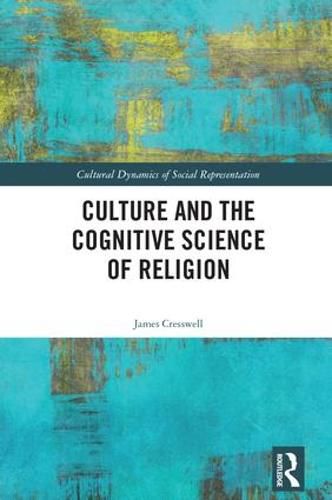Readings Newsletter
Become a Readings Member to make your shopping experience even easier.
Sign in or sign up for free!
You’re not far away from qualifying for FREE standard shipping within Australia
You’ve qualified for FREE standard shipping within Australia
The cart is loading…






Culture and the Cognitive Science of Religion is the first book to bring together cultural psychology and the cognitive science of religion (CSR). Containing much-needed discussion of how good research should do more than simply follow methodological prescriptions, this thought-provoking and original book outlines the ways in which CSR can be used to study everyday religious belief without sacrificing psychological science.
Cresswell’s pragmatist approach expands CSR in a radically new direction. The author shows how language and culture can be integrated within CSR in order to achieve an alternative ontogenetic and phylogenetic approach to cognition, and argues that a view of cognition that is not based on modularity, but on the dynamic connection between an organism and its milieu, can lead to a view of evolution that makes much more room for the constitutive role of culture in cognition.
As a provocative attempt to persuade researchers to engage with religious communities more directly, the book should be essential reading for academics, researchers and postgraduate students, as well as psychologists interested in the cognitive science of religion, theological anthropology, religious studies and cultural anthropology.
$9.00 standard shipping within Australia
FREE standard shipping within Australia for orders over $100.00
Express & International shipping calculated at checkout
Culture and the Cognitive Science of Religion is the first book to bring together cultural psychology and the cognitive science of religion (CSR). Containing much-needed discussion of how good research should do more than simply follow methodological prescriptions, this thought-provoking and original book outlines the ways in which CSR can be used to study everyday religious belief without sacrificing psychological science.
Cresswell’s pragmatist approach expands CSR in a radically new direction. The author shows how language and culture can be integrated within CSR in order to achieve an alternative ontogenetic and phylogenetic approach to cognition, and argues that a view of cognition that is not based on modularity, but on the dynamic connection between an organism and its milieu, can lead to a view of evolution that makes much more room for the constitutive role of culture in cognition.
As a provocative attempt to persuade researchers to engage with religious communities more directly, the book should be essential reading for academics, researchers and postgraduate students, as well as psychologists interested in the cognitive science of religion, theological anthropology, religious studies and cultural anthropology.